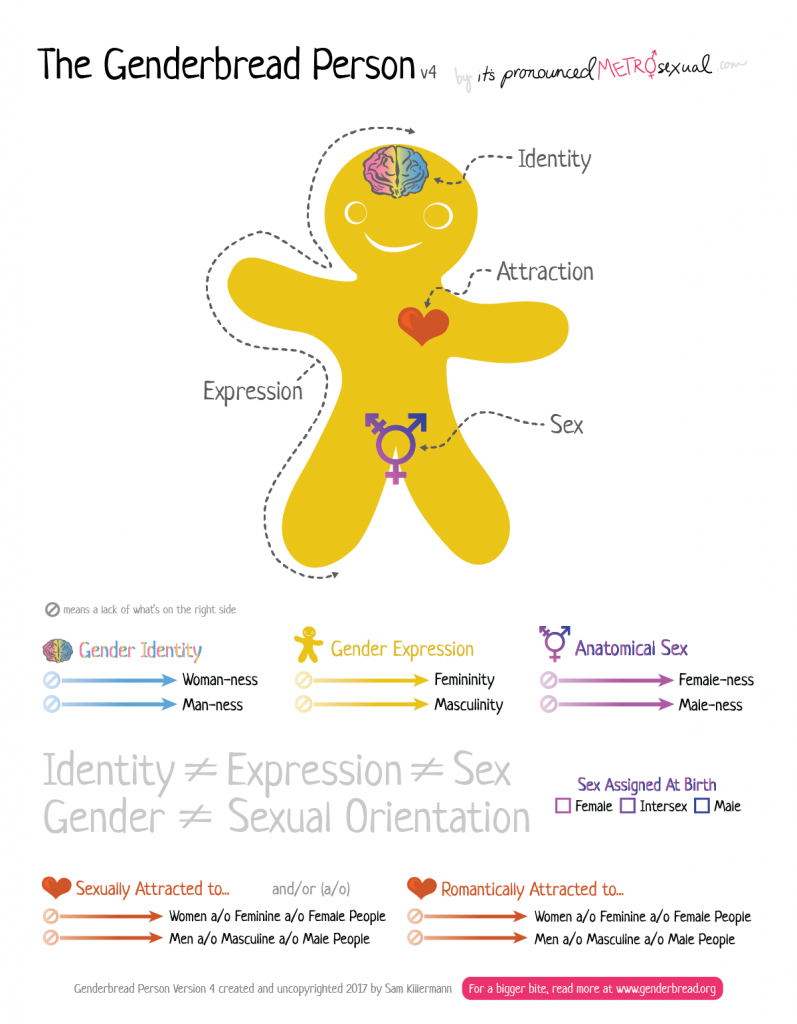School can be hard, especially if you’re different. Here’s Fumble’s guide to being an ally to your gender non-conforming peers
School is hard. It can be even harder for people trying to live their best gender non-conforming life. To help make life easier for gender non-conforming people, here is a breakdown of all things on sex and gender.
Sex vs. gender
Before we get started, let’s quickly talk about the difference between sex and gender:
- Sex refers to your anatomy and biological characteristics – i.e. your chromosomes, hormones and genitalia
- Gender relates to how you identify – how you feel in your heart and your head. It’s not what’s in your pants!

Cisgender vs. gender non-conforming
If one of your classmate’s gender ‘aligns’ with their birth sex, this is what’s known as being cisgender. For example, if someone is born with a vulva and vagina, is assigned female at birth, and identifies as a girl or woman. But some of your classmates might identify as trans, non-binary, genderless, or somewhere else on the gender spectrum. This is what’s known as being gender non-conforming.
Note: labels can be really helpful when describing parts of your identity (for example, your sexuality), but you don’t have to use them if they don’t feel right for you. You might find yourself trying out a few different labels before you find one that fits, or changing up the labels you use throughout your lifetime. Maybe you prefer no label at all – all of these are completely valid. Different people apply different meanings to labels so it’s really up to you how you want to describe yourself. Some people find a label that feels like it fits perfectly but some people won’t, and that’s okay.
Gender at school
School can be really tough for everyone at times. But gender non-conforming young people might have some additional worries and stresses, such as:
💭 Deciding which bathroom to use, or not feeling welcome in the one you’ve entered
💭 Not being allowed in the changing room you feel most comfortable in
💭 Having a teacher tell the class to split into two groups: boys and girls
💭 Being bullied for being gender non-conforming
How to be an ally to your gender non-conforming peers
1. Use their correct pronouns
Pronouns are the terms we use when we aren’t using a someone’s first name. For example, “she’s in the classroom” and “that’s his locker”.
Some people will use pronouns that align with their gender but not their birth sex. And those who aren’t male or female may use pronouns like ‘they/them’ – for example, “they are in the classroom”.
Make sure you always respect a person’s chosen pronouns. If you accidentally use the wrong one, don’t panic. Just correct yourself and continue with your sentence.
2. Don’t assume
It’s really important to not make assumptions about those who are gender non-conforming and understand that it’s okay to ask questions – as long as they’re not intrusive!
How do I know if my question is appropriate or not? If your question is going to help you understand someone’s feelings and boundaries, and you think it will make that person feel respected, then those kind of questions are encouraged. For example, asking someone what their pronouns are, what words are/are not okay to use around them (e.g., queer), or whether or not they are happy with people knowing how they identify.
However, you should avoid questions that could make the person feel uncomfortable or upset, unless they are brought up by the other person. These include questions about their body parts, their sexual orientation, what name they given when born, or how they previously identified.
3. Be kind
Those who are gender non-conforming just want to be treated equally and live a normal, happy life, but sometimes school can make this more difficult. So try and look out for your gender non-conforming classmates. You can do this by asking how they’re feeling from time to time, or if they’d like to spend break time with you if you see them sat by themselves.
4. Report bullying
If you ever see someone being bullied for being gender non-conforming (or anything else!), make sure to always tell a teacher or other trusted adult such as a Learning Support Assistant or school counsellor.
Other support
- What is transphobia and how can we challenge it?
- 6 ways to support someone who is transitioning
- The Mix – How to be a trans ally
Read more
Last Reviewed 6 September 2023
Image Credit: Kenny Eliason via Unsplash



